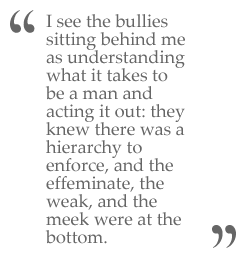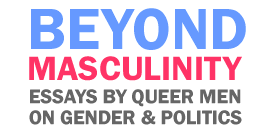|
 was a skinny, lanky kid in elementary school, the
sort that was more interested in math and fantasy
stories than in football and tag. Sexuality did not
yet play a role in how we defined gender on the
school bus, so I was not yet maligned as a “faggot”
as I sat in one of the first rows of the school bus,
but that didn’t mean that gender didn’t play a huge
role in how we related to each other.
was a skinny, lanky kid in elementary school, the
sort that was more interested in math and fantasy
stories than in football and tag. Sexuality did not
yet play a role in how we defined gender on the
school bus, so I was not yet maligned as a “faggot”
as I sat in one of the first rows of the school bus,
but that didn’t mean that gender didn’t play a huge
role in how we related to each other.
Those first few rows were reserved for those who
didn’t quite “cut it” in the social strata of my
small, rural school. As a third grader, I sat there
constantly bearing the taunts from behind. Kyle was
the worst. A few years older than I, he spent our
shared fifteen minutes on the bus kicking my feet
from behind, tapping my head, and finding as many
faults as he could in my appearance and actions: I
wore hand-me-down shirts from my aunts, I had bushy,
unkempt hair, and, perhaps worst of all, I wasn’t
able to stick up for myself or harass other kids on
the bus.
Although I could tolerate the abuse from behind for
those fifteen-minute bus rides, the harassment my
littlest brother, a kindergartener, received was far
more unbearable. If I was skinny, he was emaciated.
If I had a mop on my head, his hair was something
from a rag doll, with white, wispy locks falling
into his eyes. While I took the taunts with anger
and rage, he took them with naïveté and appreciated
the attention.
The day that sticks out most in my mind was the ride
home from school when Kyle and a few other older
boys convinced my brother that it would be cool to
flip off our mother and tell her “fuck you” when he
got off the bus. My brother seemed to take this as
wise advice (though I don’t know what he was
thinking), but I knew right away that they were
attempting to humiliate him. Outraged that he could
be so naïve, I found myself kicking him as hard as I
could when we got off the bus.
 I
couldn’t understand my actions at the time, except
to say that I was angry that he could be so duped by
these boys. Now, I see a whole system of gender and
class playing out in that scene. I see the bullies
sitting behind me as understanding what it takes to
be a man and acting it out: they knew there was a
hierarchy to enforce, and the effeminate, the weak,
and the meek were at the bottom. I
couldn’t understand my actions at the time, except
to say that I was angry that he could be so duped by
these boys. Now, I see a whole system of gender and
class playing out in that scene. I see the bullies
sitting behind me as understanding what it takes to
be a man and acting it out: they knew there was a
hierarchy to enforce, and the effeminate, the weak,
and the meek were at the bottom.
I
think I had begun to see this, and begun to realize
that I didn’t have what it took to be manly. Except
in one case: to show my brother that if he was going
to be too naïve to realize what was happening to
him, that I would show him, through kicking him in
our driveway, that I knew more about what it meant
to be strong and male than he did.
Gay and queer men often talk about having a “root” —
a time early in their lives when, looking back, they
can see they were “destined” to be gay or queer. I
prefer to think of roots in a slightly different
way. This event was one of the many roots that would
begin to define my discomfort with manhood and
masculinity.
Now, at 27 and as a queer-identified teacher,
writer, and academic living 2000 miles from my
parents’ Iowan farm, I am someone that third-grade
me wouldn’t recognize himself in. In particular, it
is my ambivalence towards identifying as a man that
may be hardest for the younger me to identify with.
This ambivalence arises every time I am asked to
mark my sex or gender on a form. This ambivalence
quickly turns to frustration when I am asked for my
"gender" but must mark either "male" or "female."
Too often, questionnaires and surveys conflate sex
and gender, and even when they don't, they limit us
to binaries: male or female, man or woman. This may
not seem like that big of a deal. After all, I’m
perceived as male-bodied and I identify as a man.
However, I am struggling with identifying as a man,
largely because of my politics and the influences of
feminist scholars whom I’ve read – such as Andrea
Dworkin, John Stoltenberg, and Catharine MacKinnon.
I’d like to chronicle here my growth from someone
who saw the world in strict categories of man and
woman into the queer man allied with feminism that I
am today.
I
believe that as a culture we are often confused
about what it means to be a man or to be a woman. In
short, we’re generally unsure what gender means.
Growing up as a man in our culture, I think, is
about struggling with what it means to be a man: how
tough to be, how to relate to women, how to bond
with other men, how men are supposed to express
emotion — and this list is just a start. Gender, it
has long been understood, is a social construction,
based on the values we have ascribed to sex. It has
been these values that we’ve ascribed to manhood
that I’ve constantly wrestled with.[1]
It
wasn't until I started studying gender as a social
system, as a codified set of rules and expectations
embedded with domination, that I began to understand
what it means to be a man. Or, rather, it wasn't
until I started applying what I was learning in
classes and in my reading to my own life that I
began to understand what it meant to be a man. I owe
much of my understanding of myself to feminist
scholarship and to gender theory. Gender activist
Riki Wilchins writes that "gender is primarily a
system of symbols and meanings—and the rules,
privileges, and punishments pertaining to their
use—for power and sexuality: masculinity and
femininity, strength and vulnerability, action and
passivity, dominance and weakness" (14, emphasis
original). As Wilchins stresses here, gender in our
society is enforced through rules and punishments;
these rules and punishments not only limit us to
rigid definitions of who we can be, but also
privilege men (as active, strong, and dominant) over
women (as vulnerable, passive, and weak). |




4 COMMENTS ON THIS ESSAY:
I just finished writing an essay about how wonderful this essay is. It's so modern and amazing. This is the best essay I have ever read. Is there more to read by Michael Faris? I would love to read more of his work.
Beautifully written, concise, and enjoyable to read. Thank you very much for this.
Really beautiful essay. An amazing message on how it would great if people could just accept others for who not what they are. Spot on about the way traditional masculinity is too often expressed by victimizing the 'other'.
I grew up in the south in the 50's and 60's so I know a lot about being picked on and bullied. I knew I was different from everyone else and couldn't understand why I was so disliked, everyone seemed to know but me, I liked more femminine things back then and when I finally opened that closet door when I was 17 it was like a whole new great world opened for me I could look people in the eye, hold my head up and was proud of myself I moved to New york and got in touch with myself and because of my life I had a much more intersesting life than all those small minded bigoted people I left behind I wish I had known someone like you , it would have made growing up a lot easier Just remember hold your head up and be proud of your unique self.